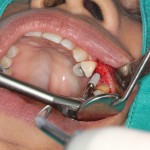
If a tooth fails to respond following non-surgical root canal re-treatment there are a number of potential treatment options, extraction and replacement using a single-tooth implant, a fixed or a removable dental prosthesis, apical microsurgery, intentional replantation and autotransplantation.
The aim of this review was to examine the literature and quantify and compare the survival of intentional replantation (IR) natural teeth with that of contemporary implant-supported single crowns (ISCs).
Methods
Searches were conducted in PubMed, Embase, The Cochrane Library, and Web of Science databases for human studies with a minimum of 10 cases of intentional replantation for endodontic purposes, and implant-supported single crown studies with a minimum follow-up period of 2 years. Studies were given an overall quality score.
Results
- 8 IR studies involving a total of 838 teeth and 27 ISCs studies involving a total of 4130 implants were included.
- For IR teeth
- Overall mean survival of 88% (95% CI, 81%–94%)
- Root resorption was reported as an adverse effect in all studies with an overall prevalence of 11%.
- For ISCs
- Overall mean survival of 97% (95% CI, 96%–98%)
- ISCs had a significantly higher mean survival than IR teeth.
Conclusions
The authors concluded:
A systematic review and meta-analysis found that the mean survival of ISCs was significantly higher than IR teeth. However, treatment decisions must be based on a wide variety of treatment and patient-specific parameters. Intentional replantation may have a role when ISC is not practicable. Studies using contemporary treatment and analytic methods should be used to identify and measure intentional replant prognostic and treatment variables.
Comments
A wide-ranging search of the literature was carried out but the reported details of the selection process and data abstraction are not clear. While an overall study quality score was undertaken, the details of this were not presented. The authors did however note in the discussion that the IR literature was limited by the small number of publications, heterogeneity, publication bias, and age of publication. It is also important to remember that this review is in fact two independent summaries of the literature on IR and ISCs as there are no studies providing direct comparisons. The survival rate for ISCs in this review is very similar to a 2008 review by Jung et al that included 26 studies (prospective and retrospective cohorts) and found a survival rate of 96.8% (95% CI; 95.9-97.6%] after 5 years. More recently a review by Chrcanovic et al (Dental Elf 12th Dec 2014) suggested that single implants placed in fresh sockets had a higher failure rates than those placed in healed site.
Links
Torabinejad M, Dinsbach NA, Turman M, Handysides R, Bahjri K, White SN. Survival of Intentionally Replanted Teeth and Implant-supported Single Crowns: A Systematic Review. J Endod. 2015 Mar 2. pii: S0099-2399(15)00013-8. doi: 10.1016/j.joen.2015.01.004. [Epub ahead of print] Review. PubMed PMID: 25742795
Jung RE, Pjetursson BE, Glauser R, Zembic A, Zwahlen M, Lang NP. A systematic review of the 5-year survival and complication rates of implant-supported single crowns. Clin Oral Implants Res. 2008 Feb;19(2):119-30. Epub 2007 Dec 7. Review. PubMed PMID: 18067597.

Don’t miss – Intentionally replanted teeth: a treatment option? http://t.co/pSIZhZSctk #EBP
[…] Dental Elf – 1st April 2015 – Intentionally replanted teeth: a possible treatment option… […]